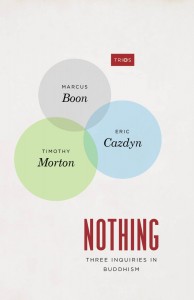 The University of Chicago Press published Nothing: Three Inquiries in Buddhism and Critical Theory, by Eric Cazdyn, Timothy Morton and myself, in their Trios series in Fall 2015. As with other books in the Trios series, the book consists of three longish (25,000 words plus!), quantum entangled essays, in this case exploring the relationship, or lack thereof, between Buddhism and Critical Theory. My own essay is entitled “To Live in a Glass House is a Revolutionary Virtue Par Excellence: Buddhism, Marxism and the Politics of Non-Alignment.” Although Buddhism played an important role in In Praise of Copying, especially in terms of rethinking the meaning of practices of copying, this essay is a more direct attempt to write about what Buddhism means to me today, and what role it can play in twenty-first century critical thought.
The University of Chicago Press published Nothing: Three Inquiries in Buddhism and Critical Theory, by Eric Cazdyn, Timothy Morton and myself, in their Trios series in Fall 2015. As with other books in the Trios series, the book consists of three longish (25,000 words plus!), quantum entangled essays, in this case exploring the relationship, or lack thereof, between Buddhism and Critical Theory. My own essay is entitled “To Live in a Glass House is a Revolutionary Virtue Par Excellence: Buddhism, Marxism and the Politics of Non-Alignment.” Although Buddhism played an important role in In Praise of Copying, especially in terms of rethinking the meaning of practices of copying, this essay is a more direct attempt to write about what Buddhism means to me today, and what role it can play in twenty-first century critical thought.
I’ve known Eric since I moved to Toronto in 2002, and Buddhism (not to mention Marxism) is something we’ve talked about almost since the beginning. Buddhist thought is present in a variety of ways in Eric’s recent book The Already Dead — notably in his reading of the Tibetan Book of the Dead. I met Tim in California in 2009 after reading his essay “Hegel on Buddhism” — it turns out that we grew up about ten miles away from each other in the west London suburbs, and shared some of the same Buddhist teachers and more. Buddhism has played an important role in much of Tim’s work — in Ecology Without Nature, The Ecological Thought and his recent Hyperobjects. The three of us put together a panel on Buddhism and theory for the MLA in Los Angeles in 2011, and the Trios book project has evolved out of that. It also began as a response to the various critiques of contemporary Buddhism made by Slavoj Zizek — a challenge that we’ve all responded too in often very different ways.
My essay is a meditation on the relationships, historical, theoretical and prospective, between Marxism and Buddhism, and tracks the way in which a number of thinkers (including Georges Bataille, Gendun Chopel, Gary Snyder, Thomas Merton and the Speculative Non-Buddhist writers) have understood this relationship. The first half of the essay examines Bataille’s interest in Buddhism and yoga, and makes the argument that many of the key Bataillean concepts in use in theory today (sovereignty, formlessness, general economy, the community that has nothing in common) have their origins in Bataille’s attempts to reconcile post Popular Front leftism with the unnameable excesses and nothingnesses of meditation and tantric yogic practices. The essay then situates Bataille’s struggles to formulate a politics of yoga within the broader post WWII geopolitical context of the Cold War, and the problem of how to formulate a non-aligned politics (which in Asian societies often took the form of innovative attempts to reconcile Buddha and Marx). The essay concludes by looking at the way Buddhism, post-Bataillean or not, haunts attempts to envision a post-capitalist politics today.
Here are the amazing blurbs from the back of the book:
“I have contemplated and endured NOTHING for so long that it did not seem right to break my practice or offer other readers something like insight, possibly a moment of sense-making and affirmation. But I break out of my trance to assert the emphatic necessity of this book, so erudite without loading us down, relentless in its ability to resignify. Sassy, brilliant, a genuine engagement with and of thought, this work tunes us to a thrilling, endorphinating way of thinking: my drug of choice.”—Avital Ronell, New York University
“The reader will delight in two important aspects of Nothing: a multitude of contemporary Buddhist responses to the great political and social changes that have affected Asian countries—imperialism, colonialism, communism, corporate capitalism—and rigorous elaboration of Lacanian psychoanalysis with Buddhist psychology. This book is exceptional.”—Alphonso Lingis, Pennsylvania State University